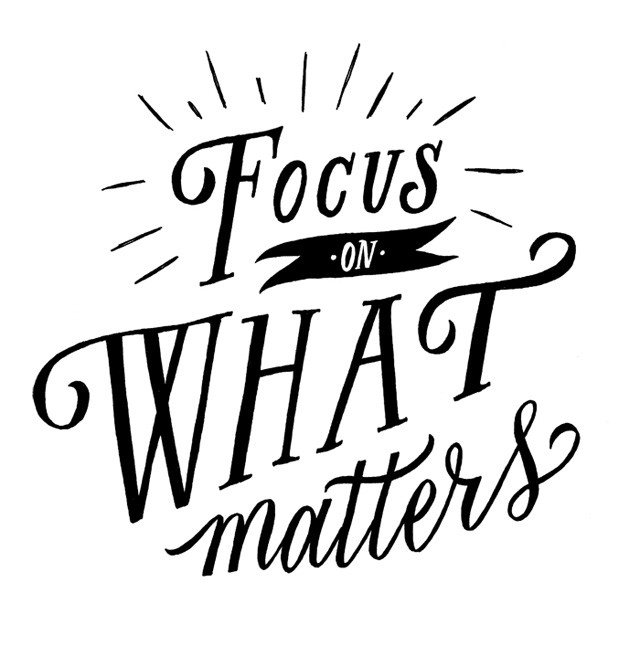The big question isn’t whether you’re going to make a resolution this New Year—but whether or not you’re going to keep it! Although studies have shown that 75% of people keep their New Year’s resolution through the first week of the year, only 8% of people are actually successful in achieving that resolution.1
Despite this bleak statistic, the truth is that you can achieve the goals you set out to accomplish, if you really want to. Planning the steps to reach your goal and then fully committing to that plan—rather than just thinking about your goal from time to time—can make all the difference. Studies show that people who make resolutions explicitly by stating their goals clearly and with specific detail are 10 times more likely to reach their goals than those who don’t.2
So how can you make sure the goals you set for yourself will actually come to fruition? Here are five powerful ways to achieve the targets you set for yourself this year.
1. Pick One, Concrete “Must-Do” Goal for 2014
“People overestimate what they can do in a year, but underestimate what they can do in a decade.”—Tony Robbins
Setting goals for the coming year is fantastic. Just make sure that you don’t set too many. By giving yourself too many targets to achieve in one year, you’ll end up scattering your energy and you may have trouble following each goal through to completion.
You can avoid this by setting one major, specific goal you want to accomplish during the year.
For example:
- Launch my product by July 1st.
- Publish an eBook by August 15th.
- Start a podcasting series and broadcast once a month.
- Create a blog and post on it twice a week.
In addition to giving your goal some necessary focus, you also want to make sure it’s the right goal. Your goal should be . . .
- A bit of a stretch. You’re going to put a lot of focus into this goal, so challenge yourself. Make sure it’s something you’ll feel really good about achieving. This will help keep you on track if your motivation wanes.
- Reasonable. Does your goal have some wiggle room to accommodate all of life’s emergencies? If not, adjust it a little to be more realistic. Move your launch date back a month to give yourself some breathing room. If you’re debuting a new blog, start out with weekly posts for a few months before dedicating yourself to posting more frequently. Keeping your goals reasonable will keep you from getting derailed early, which often disrupts New Year’s resolutions for good.
- Measurable. If you don’t measure your goal, how will you know when you’ve achieved it—or, more importantly, when to celebrate? Define a concrete finish line and the milestones you’ll hit along the way, and assign dates to each. Consistently rewarding yourself along the way will provide some pleasurable incentives to keep going, even when times get tough.
Once you’ve chosen your goal, write it down and put it in a place where you will see it every day: on your refrigerator, in a frame on your desk, on a note stuck to your computer, wherever. Putting your goal on paper does a couple of things. It will help you state in clear terms exactly what you want. It also makes your goal more “real” by giving it tangible form, which also helps you focus on that goal in spite of any distractions in your life.
Now that you’ve decided on your goal, it’s time to . . .
2. Commit Your Resources to Your Goal
“The difference between a successful person and others is not a lack of strength, not a lack of knowledge, but rather a lack of will.” —Vince Lombardi
If you chose your goal well, recognize that reaching it is going to be a challenge. Life will get in the way, and there will be times when you just won’t feel like working toward your goal. Completing any goal of significant worth is going to require you to remind yourself of why you’re working toward that goal in the first place, and also to continually recommit to it.
This starts by associating yourself to your goal emotionally on a regular basis. Take a few minutes to sit quietly and imagine the emotions you’ll feel when you achieve your goal. Allow them to flood through you. Even though you’re imagining these emotions, you can still get a significant portion of the benefits. The more clearly you can imagine yourself achieving this goal, the more powerful a bond you’ll establish with your goal.3 This bond will help motivate you throughout the project.
Enhance your environment to support your goal. Surround yourself with things that bolster your goal and put you in a mindset to pursue it. Share your goal with people who will back you and be your support system while you work to achieve it.
When you start to lose faith—or feel like playing hooky—recommit to your vision. Remind yourself of why you’re working toward this goal in the first place, and what the outcome will be once you achieve it. Imagine how things will be when you’ve reached your goal.
Now that you’ve got yourself emotionally invested in your outcome, you’ll need to . . .
3. Make Your Goal a Part of Your Schedule
“We are what we repeatedly do. Excellence, then, is not an act, but a habit.” —Aristotle
“Finding time” is a myth. None of the entrepreneurs we know have ever stumbled upon an extra half hour in the day. If you really want to get something done, you need to make time for it.
Schedule a consistent block of time during the week to work on your goal. This could be 9:00-10:00 am every day, or 2:00-4:00 pm, or maybe even 10:00–11:00 pm at night—whatever works for you. Put it in your calendar as an important event, so it’s an unbreakable appointment in your schedule. Don’t allow that time to get co-opted, even by clients. Remember that your work is just as important as everyone else’s.
When life catches up to you—as it often does—and you absolutely have to reschedule, don’t wait to make another date with yourself. Reschedule that missed appointment immediately, just as you would an important meeting.
These unbreakable dates with yourself will add up and become a powerful force that moves you closer and closer to your goal.
Of course, you’ll also want to . . .
4. Give Yourself Permission to Slip Up
“Fall down seven times, get up eight.” —Japanese proverb
There will be some weeks when you’ll take big steps toward your goal, and then there will be times—even months—when you’ll find yourself off track. When the inevitable happens, don’t get mired in beating yourself up about it.
Instead, acknowledge your misstep and focus on what you can do next time that will prevent it from happening again.
Determine what happened that threw you off track. Narrow it down so you know exactly what occurred that caused the misstep, whether it was one isolated event or a series of them.
Figure out what you can do to prevent it from happening again. What action can you take to stay on course?
Recommit to your goal. Remind yourself of why you’re setting out to achieve this goal in the first place. How exactly is it going to benefit you?
Plot your next step. What do you need to do now in order to get back on track and continue toward your target?
Keep in mind that any project is ultimately a work in progress. You are in the midst of achieving your goal, and it will take time to get there. The important thing is that you have committed to a goal in the first place—a huge achievement in itself—and are taking action toward reaching it. You’ve taken that first step forward, and then the next, and then the next. Acknowledge yourself for coming this far and pushing yourself to realize your dreams.
Rather than harping on your errors and missteps along the way, focus instead on the fact that you are working toward accomplishing a goal you’ve set for yourself—which is more than many people can say for themselves.
And, finally, make sure you take time to . . .
5. Celebrate Your Achievements
“Develop an attitude of gratitude, and give thanks for everything that happens to you, knowing that every step forward is a step toward achieving something bigger and better than your current situation.” —Brian Tracy
Sometimes we feel that our hard work goes unnoticed by others, which can be frustrating. Even more concerning, though, is how often we forget to acknowledge our own achievements.
Remind yourself to take a step back, look at what you’ve accomplished, and pat yourself on the back for it. Celebration for hard work is an important part of maintaining a positive attitude about what you do. Consider these points about the value of celebrating:
- A study conducted by Healthstream, Inc. shows that “companies that effectively appreciate employee value enjoy a return on equity and assets more than triple that experienced by firms that don’t.”4
- The U.S. Bureau of Labor Statistics reports that 81% of employees feel that career celebrations help them feel appreciated for their work.5
- In his book The 7 Habits of Highly Effective People, Stephen R. Covey, PhD, writes that next to physical survival, “the greatest need of a human being is psychological survival, to be understood, to be affirmed, to be validated, to be appreciated.”
To ensure that you acknowledge all of the hard work you’re putting in as you go along, try keeping track of your journey. Record the milestones you reach on your way to your goal by jotting them down in a notebook or a Word document on your computer. Sometimes we don’t realize how much we’ve gotten done or that we actually are moving forward and growing.
Then, once a month, take some time to review the progress you’ve made toward achieving your goal. Look at the successes you’ve experienced so far. Whenever you get discouraged, reviewing the milestones you’ve recorded and seeing all of the things you’ve accomplished thus far can really help pump up your spirit and determination.
Reward yourself for achieving your goal, as well as all the mini-goals you reach along the way. Every time you jump to a new stepping stone on the way to your goal, treat yourself in some way—with a nice dinner out, a weekend trip, or a new gadget you’ve been eyeing. When you reach your ultimate goal, be sure to reward yourself with something really special.
And although we’re focusing on the acknowledging yourself for working toward your goal in particular, it’s a good idea to also do this for your progress in other areas of your life!
This year, let’s break the mold together and make our New Year’s resolutions a reality! Follow these 5 steps to achieve whatever goal you set for yourself in 2014. Then, once you’ve finished (and celebrated!), feel free to use this same process to do it all over again. With each goal completed, you’ll move yourself closer and closer to a reality that matches your vision.
References:
1Statistic Brain, “New Years Resolution Statistics,” http://www.statisticbrain.com/new-years-resolution-statistics.
2Ibid.
3The Best Brain Possible, “Get the Picture,” http://www.thebestbrainpossible.com/tag/alan-richardson.
4Forbes, “Make More Money By Making Your Employees Happy,” http://www.forbes.com/sites/stevecooper/2012/07/30/make-more-money-by-making-your-employees-happy.
5O.C. Tanner, “Celebrate Careers,” http://www.octanner.com/institute/white-papers/celebrate-careers%C2%99.





